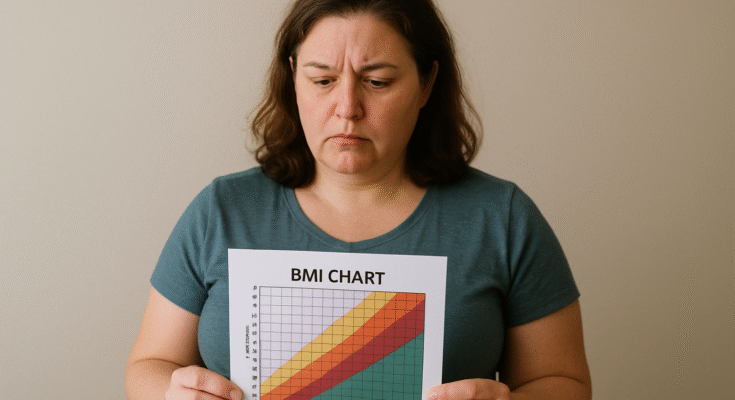If you’re wondering about BMI requirements for Ozempic, you’re not alone. With more than half of U.S. adults now qualifying to take semaglutide, understanding the specific criteria can help you determine if this popular medication might be right for you.
The Simple Answer: BMI Requirements for Ozempic
The BMI requirements for Ozempic depend on whether you’re using it for diabetes or weight loss, and whether you have additional health conditions. For weight loss purposes, you typically need a BMI of 30 or higher, or a BMI of 27 or higher if you have weight-related health problems like high blood pressure or diabetes. However, if you’re using Ozempic for type 2 diabetes management, there’s no specific BMI requirement since it’s FDA-approved for this purpose regardless of your weight.
What BMI Do You Need for Ozempic? Complete Eligibility Guide
If you’re wondering about BMI requirements for Ozempic, you’re not alone. With more than half of U.S. adults now qualifying to take semaglutide, understanding the specific criteria can help you determine if this popular medication might be right for you.
The Simple Answer: BMI Requirements for Ozempic
The BMI requirements for Ozempic depend on whether you’re using it for diabetes or weight loss, and whether you have additional health conditions. For weight loss purposes, you typically need a BMI of 30 or higher, or a BMI of 27 or higher if you have weight-related health problems like high blood pressure or diabetes. However, if you’re using Ozempic for type 2 diabetes management, there’s no specific BMI requirement since it’s FDA-approved for this purpose regardless of your weight.
Understanding BMI and Ozempic Eligibility
What Is BMI and Why Does It Matter?
Body Mass Index (BMI) is a measurement that uses your height and weight to determine if you’re in a healthy weight range. Healthcare providers use BMI as one factor to assess whether you might benefit from weight management medications like Ozempic. The BMI scale categorizes people as underweight (below 18.5), normal weight (18.5-24.9), overweight (25-29.9), or obese (30 and above).
The Two Different BMI Thresholds
If your BMI is 30 or above, you generally qualify for Ozempic for weight loss purposes, even without additional health conditions. This threshold indicates obesity, where the potential benefits of weight loss medication typically outweigh the risks. However, patients with a BMI between 27 to 30 can also be eligible if they have comorbidities such as hypertension, high cholesterol, sleep apnea, or hormonal conditions. These weight-related health problems make you a candidate for treatment even at a lower BMI.
Common Weight-Related Health Conditions That Qualify You
Having certain health conditions can make you eligible for Ozempic even if your BMI is between 27-29.9. These conditions frequently occur alongside excess weight and can improve with weight loss. High blood pressure, type 2 diabetes, high cholesterol, sleep apnea, cardiovascular disease, polycystic ovary syndrome (PCOS), and non-alcoholic fatty liver disease are all examples of conditions that healthcare providers consider when evaluating your eligibility for Ozempic treatment.
Ozempic vs. Wegovy: Understanding the Difference
Here’s where things can get confusing. Ozempic and Wegovy both contain the same active ingredient called semaglutide, but they’re approved for different purposes. Ozempic is FDA-approved for type 2 diabetes management, and when used for weight loss, it’s considered “off-label” use. Wegovy, on the other hand, is FDA-approved specifically for weight loss in people with a BMI of 30 or greater, or BMI of 27 or greater with an accompanying overweight- or obesity-related condition.
The BMI requirements are essentially the same, but Wegovy is the version specifically designed and approved for weight management. This distinction can affect insurance coverage and how your doctor approaches prescribing the medication.
Real-World Examples: Who Qualifies?
Let’s look at some practical examples to help you understand how BMI requirements work in real situations. Sarah is 5’6″ and weighs 185 pounds, giving her a BMI of 29.8. Even though her BMI is under 30, she has high blood pressure, which makes her eligible for Ozempic because she has a weight-related health condition.
Mike is 5’10” and weighs 210 pounds, resulting in a BMI of 30.1. He doesn’t have any other health conditions, but his BMI of 30 or higher makes him eligible for treatment. In contrast, a 5-foot-4 woman weighing 158 pounds would be in the overweight but not obese category. Without additional health conditions, she likely wouldn’t meet the standard BMI requirements for Ozempic.
Beyond BMI: Other Factors Doctors Consider
While BMI is important, healthcare providers look at several factors when determining Ozempic eligibility. Your complete medical history plays a crucial role, including any previous weight loss attempts, medications you’re currently taking, and underlying health conditions that might affect treatment success or safety.
Your doctor will also assess your overall health beyond just BMI, including blood pressure, blood sugar levels, and other metabolic markers. They want to ensure you have realistic expectations about weight loss and understand that Ozempic works best when combined with lifestyle changes like improved diet and regular exercise.
Healthcare providers also evaluate your commitment to making lifestyle changes because Ozempic is not a stand-alone solution. It should be part of a larger weight-loss strategy that includes healthy eating patterns and increased physical activity.
How to Calculate Your BMI
Calculating your BMI is straightforward using the formula: BMI equals your weight in pounds times 703, divided by your height in inches squared. Alternatively, you can use the metric formula where BMI equals weight in kilograms divided by height in meters squared. Many online BMI calculators can do this math for you, but it’s helpful to understand where your number comes from and how small changes in weight can affect your BMI category.
What If You Don’t Meet the BMI Requirements?
If your BMI doesn’t meet the standard requirements, you still have several options to explore with your healthcare provider. Focus on discussing any weight-related health issues you might have, even if they seem minor. Conditions like prediabetes or metabolic syndrome might make you a candidate even with a BMI under 30.
Your healthcare provider might recommend other weight management strategies, including different medications, lifestyle interventions, or referrals to specialists like dietitians or endocrinologists. It’s also worth noting that BMI can change over time, so if your weight increases or you develop weight-related health conditions, you might become eligible in the future.
The Insurance Factor
Even if you meet the BMI requirements medically, insurance coverage is another important consideration. Many insurance plans have their own criteria for covering weight loss medications, which may be more restrictive than medical guidelines. Insurance companies often require documentation of previous weight loss attempts, specific BMI thresholds, proof of weight-related health conditions, and regular monitoring and follow-up appointments.
This means you might be medically eligible for Ozempic but still face challenges getting insurance coverage. Working with your healthcare provider to document your medical need and exploring patient assistance programs can help navigate these challenges.
Recent Changes and Updates
The landscape for weight loss medications is evolving rapidly, with new research and approvals changing the eligibility criteria. Recent studies have shown promising results for semaglutide in various populations, and the FDA continues to evaluate new applications for the medication.
This ongoing evolution means eligibility criteria and insurance coverage may continue to change, so it’s important to stay informed and work closely with your healthcare provider to understand the most current guidelines and options available to you.
Questions to Ask Your Doctor
When discussing Ozempic with your healthcare provider, preparation can help you get the most from your appointment. Ask about your candidacy based on your BMI and health history, and discuss the potential benefits and risks for someone with your specific profile. Understanding how your progress would be monitored and what treatment adjustments might be necessary can help you make an informed decision.
It’s also important to discuss what lifestyle changes you should make alongside the medication and whether your insurance is likely to cover the treatment. Your doctor can help you understand the complete picture of what Ozempic treatment would involve for your situation.
The Bottom Line
The BMI requirements for Ozempic are generally straightforward: you need a BMI of 30 or higher, or a BMI of 27 or higher with weight-related health conditions. However, every person’s situation is unique, and your healthcare provider is the best person to determine if Ozempic is appropriate for you.
Remember that BMI is just one tool among many that doctors use to assess your health. Your individual circumstances, medical history, and health goals all play important roles in determining the best approach to weight management. The decision to start Ozempic should be based on a comprehensive evaluation of your health, not just a single number on the BMI scale.
If you’re considering Ozempic, the most important step is having an honest conversation with your healthcare provider about your health goals, medical history, and whether this medication aligns with your overall health plan. They can help you understand not just whether you qualify based on BMI, but whether it’s the right choice for your specific situation and health needs.
Weight management is a journey that requires patience, commitment, and often multiple approaches. Medications like Ozempic are tools that work best as part of a comprehensive approach that includes healthy eating, regular physical activity, and ongoing medical support. Whether your BMI puts you in the qualifying range or not, there are always steps you can take to improve your health and work toward your goals with the guidance of your healthcare team.

James Rowen is a certified medical writer and healthcare researcher specializing in endocrinology and metabolic health. With over a decade of experience analyzing weight management therapies, James has developed deep expertise in GLP-1 receptor agonists, including Ozempic.




